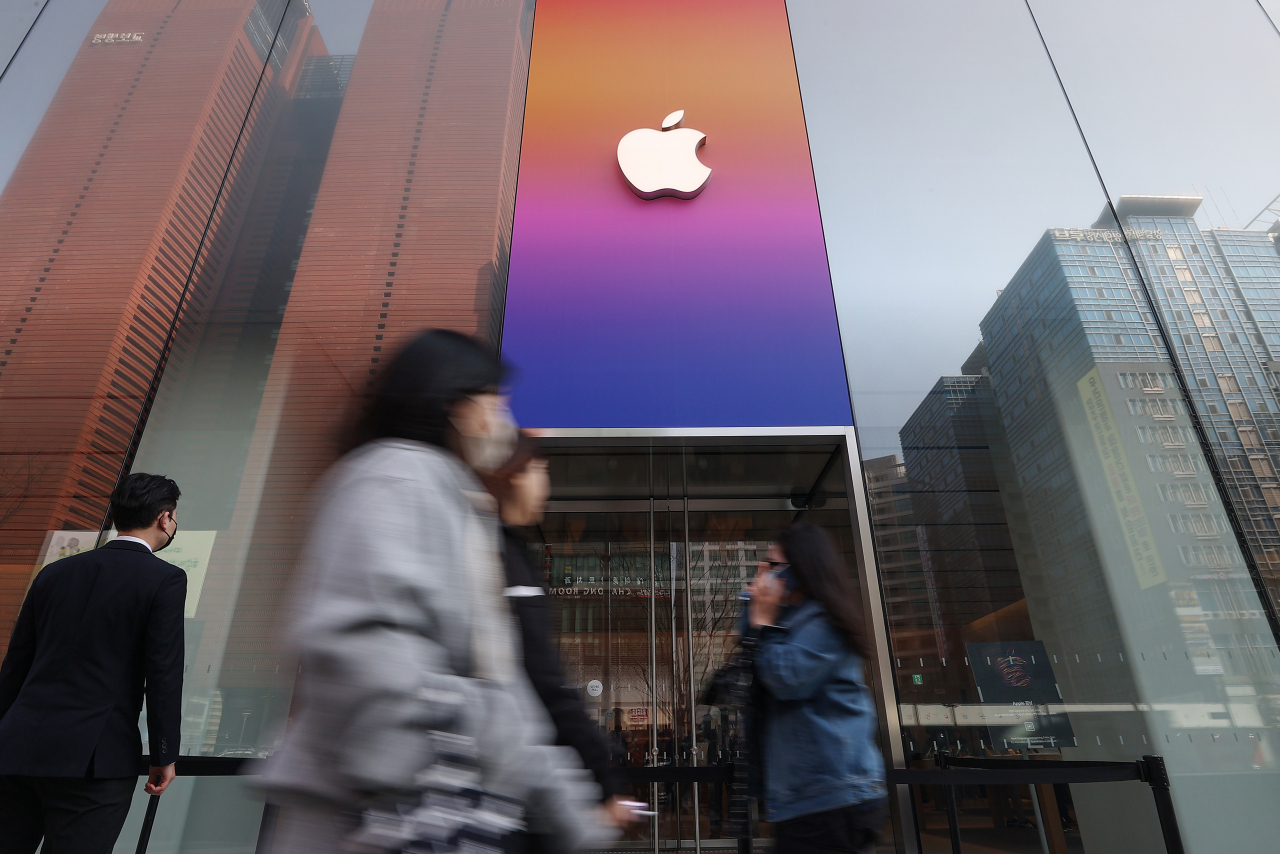[KH Explains] Apple ups ante in Samsung's home ground
Despite Samsung's unrivaled dominance, Apple pins high hopes on Gen Z, half of whom are iPhone users
By Jie Ye-eunPublished : April 10, 2023 - 16:37

US tech behemoth Apple has long maintained a low profile in South Korea, the home of its archrival Samsung Electronics, where the iPhone maker takes up a “modest” share of the market at about 20 percent.
More recently, the US company seems to be upping the ante here, possibly pinning its hopes on Generation Z -- those born between 1997 and 2012 -- almost half of whom are believed to be iPhone users.
According to a recent survey conducted by Gallup Korea, about 52 percent of people aged between 18 and 29 said they were using iPhones as of the end of 2022. This means that while Samsung may be outpacing Apple in overall smartphone sales, it lags behind when it comes to winning the hearts of younger consumers, who are likely to become the dominant consumer group in the near future.
“Samsung itself has lacked the ‘wow factor’ to excite Gen Z,'” said Lee Eun-hee, a consumer science professor at Inha University. “It’s worth noting that Samsung is considered an ‘old brand’ among them as it doesn’t embody a different kind of value that makes its users feel proud like Apple does.”
In a renewed push to expand its presence here, Apple is opening a series of new retail stores, including the latest Apple Gangnam in southern Seoul. The Gangnam store attracted much attention as it is located less than a kilometer away from Samsung’s Delight brand shop within the so-called Seocho Samsung Town. In a rare collaboration with celebrities, the company invited K-pop girl band NewJeans to promote the new store opening.
Since the first Apple Store opened in Seoul’s Garosugil in 2018, the company operates a total of five stores. A sixth store is rumored to be opening near Hongdae, the pinnacle of youth culture in western Seoul, later this year.
Last year, Apple logged 7.3 trillion won ($5.5 billion) in Korean sales.
Possibly taking a cue from Apple’s bigger presence in its home ground, Samsung recently rebranded its retail store, called Samsung Digital Plaza, into the Samsung Store, the first revamp since the brand was launched 23 years ago.
“Samsung is seeking to refurbish the store space overall to better appeal to young customers like the Apple Stores (have done), but it seems to feel limitations because of the company’s diverse product lineup from smartphones to refrigerators to large TV sets,” said an industry source close to the matter.
Apple’s mobile payment service Apple Pay also recently made a highly-publicized debut here after a nearly 10-year hiatus.
Many users complain about a lack of infrastructure in the initial phase. Of the nation’s some 2.9 million stores nationwide, only 70,000 stores are estimated to be equipped with near-field communication readers that work with Apple Pay.
But iPhone users who had long been marginalized amid a near monopoly of Samsung Pay are responding explosively to the brand-new service. On the first day alone, more than 1 million iPhone users registered for membership to use the brand-new service, according to its official credit card partner, Hyundai Card.
Industry watchers expect Apple Pay’s expansion could be directly linked to the increased sales of iPhones in the future as mobile payment is increasingly being perceived as a key feature for smartphone users here.
In response, Samsung is also bolstering its preparedness as it has launched a task force, according to sources. Ahead of Apple Pay’s arrival, Samsung already teamed up with Naver and Kakao, the nation’s top two internet companies who are also key players in the burgeoning mobile payment market.
Samsung is also reportedly considering applying the Samsung Pay feature to its Galaxy Watch smartwatch as Apple Watches support the Apple Pay service here.
“While individuality and aesthetics are important to Gen Z, they're also very much into a brand image. If we apply these trends to smartphones, we get to understand why young people look for iPhones more,” another industry official said on condition of anonymity.
In another poll conducted by local market tracker Vinu Labs, 89 percent of college students here described Apple’s brand image as “trendy,” followed by “refined” and “luxury.” Among the iPhone users surveyed, 87 percent said they would stick with the same brand, while the figure among Galaxy phone users stood at 74 percent.




















